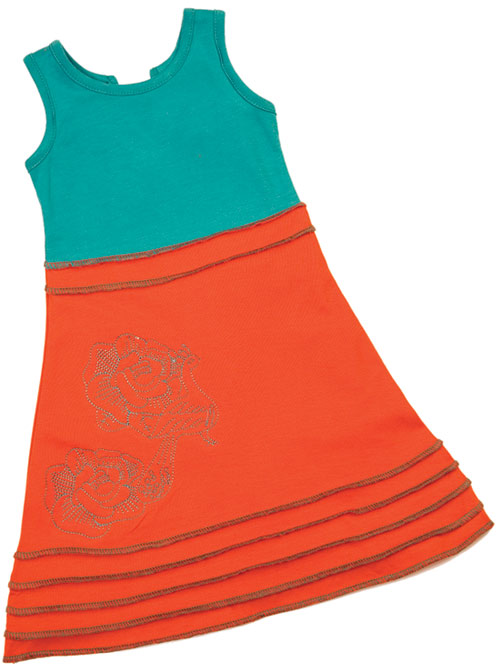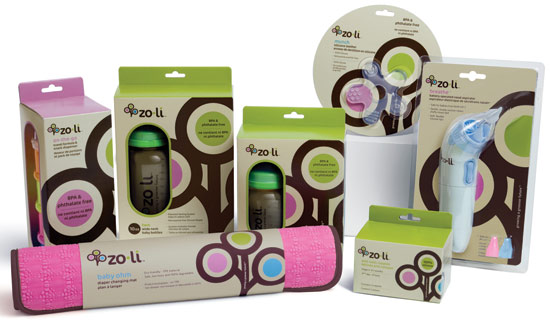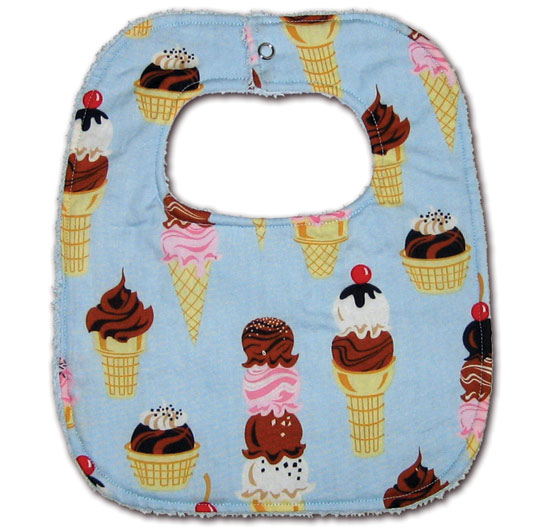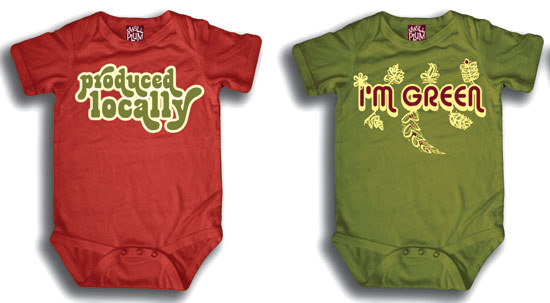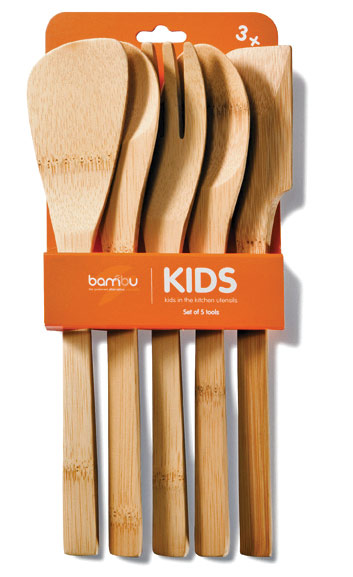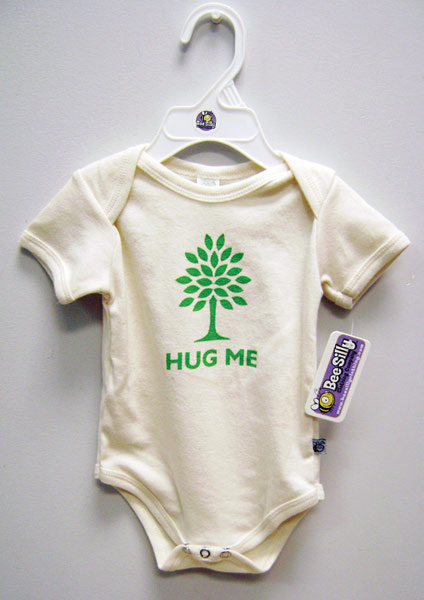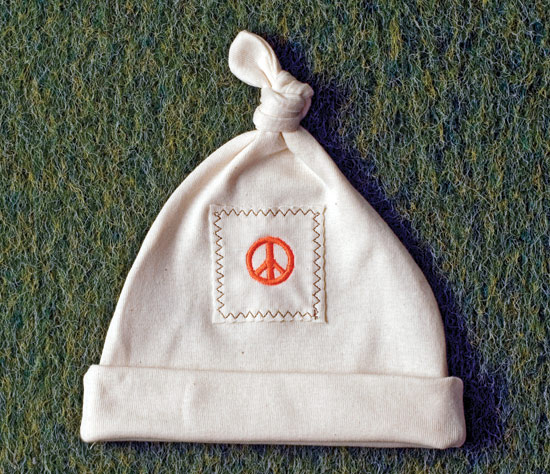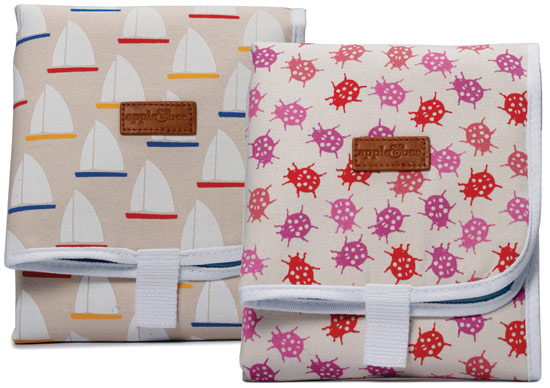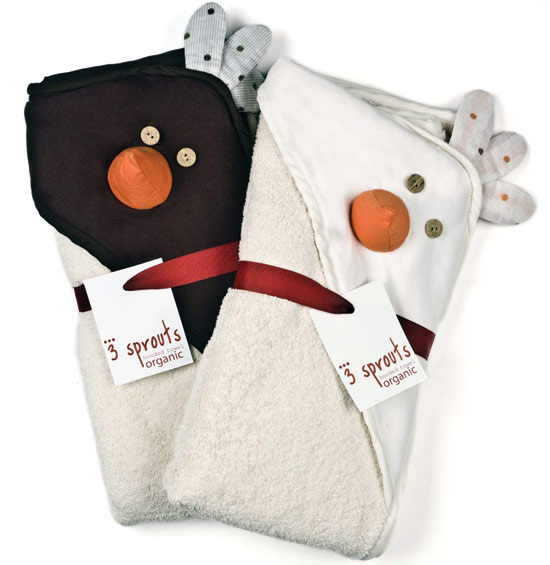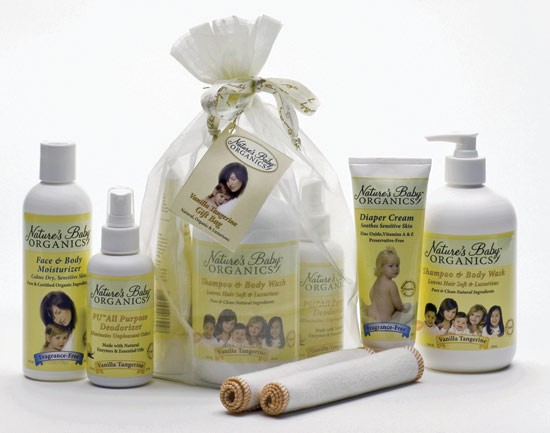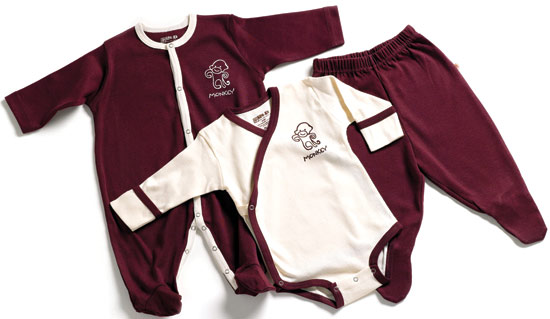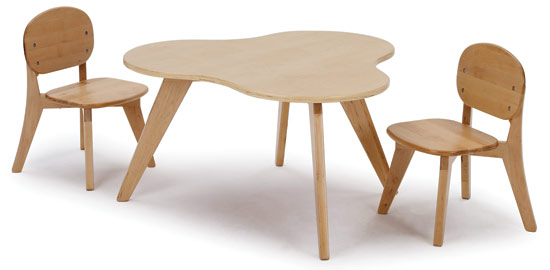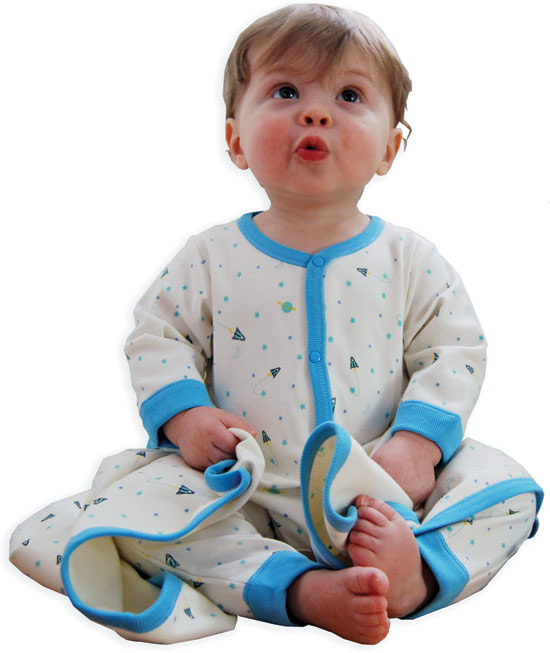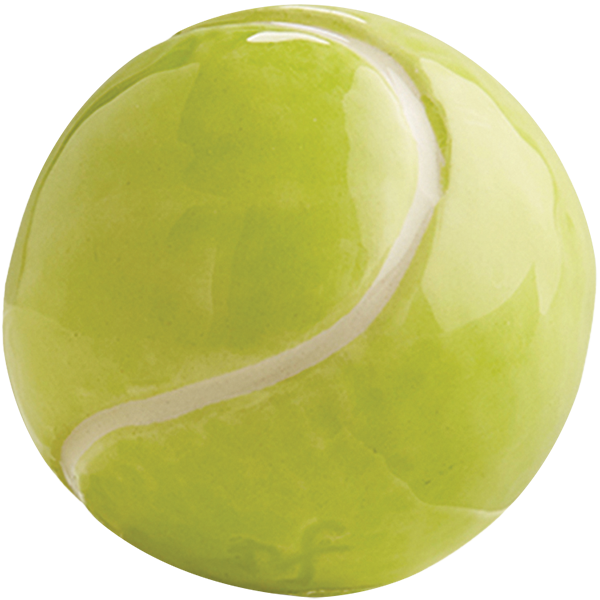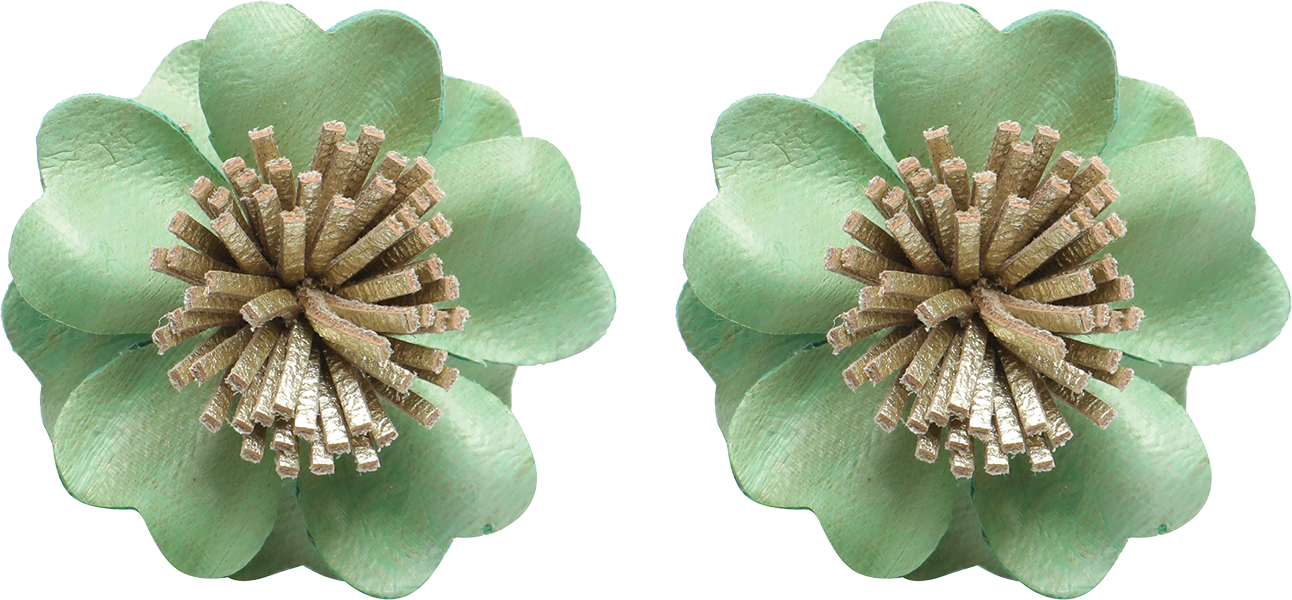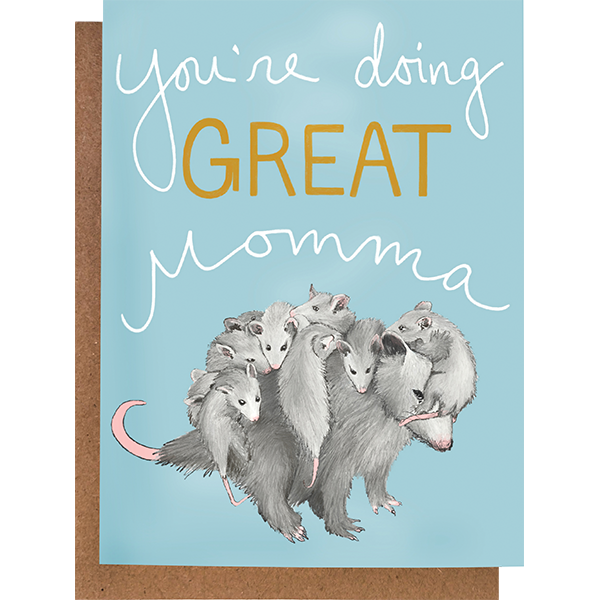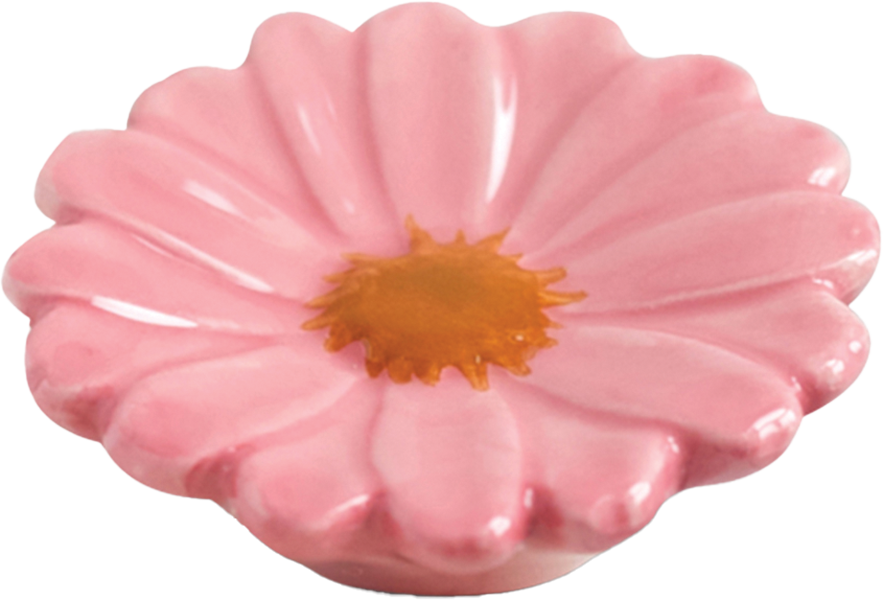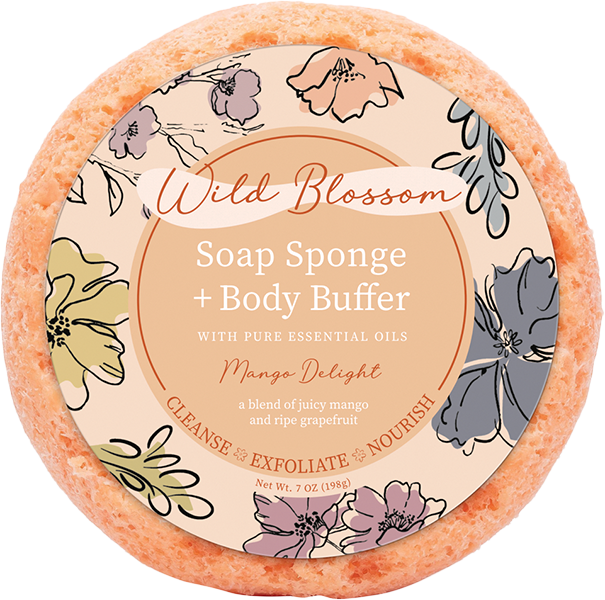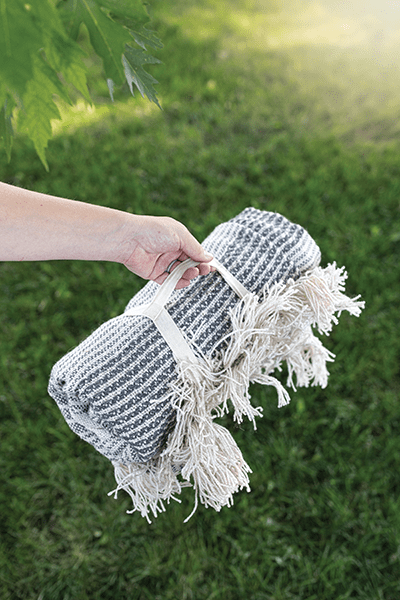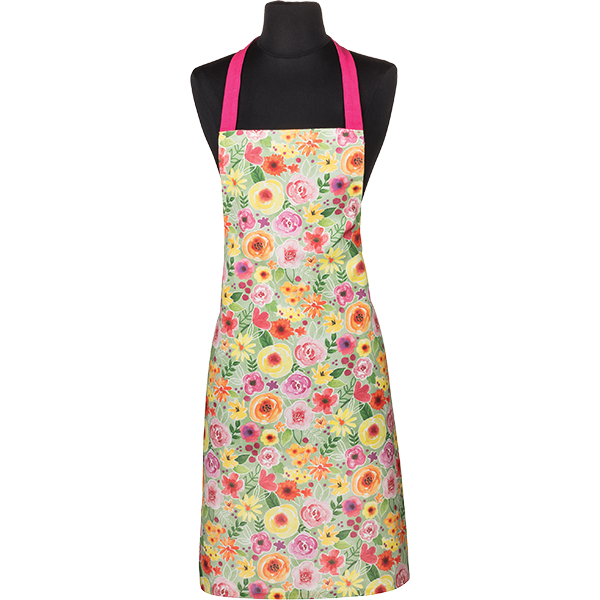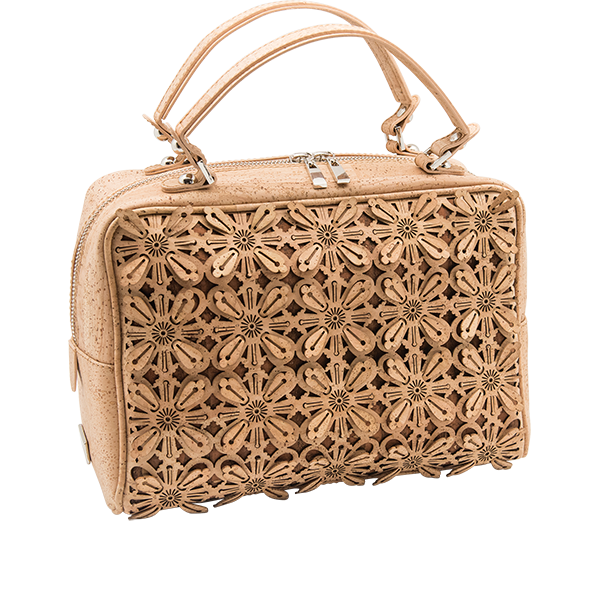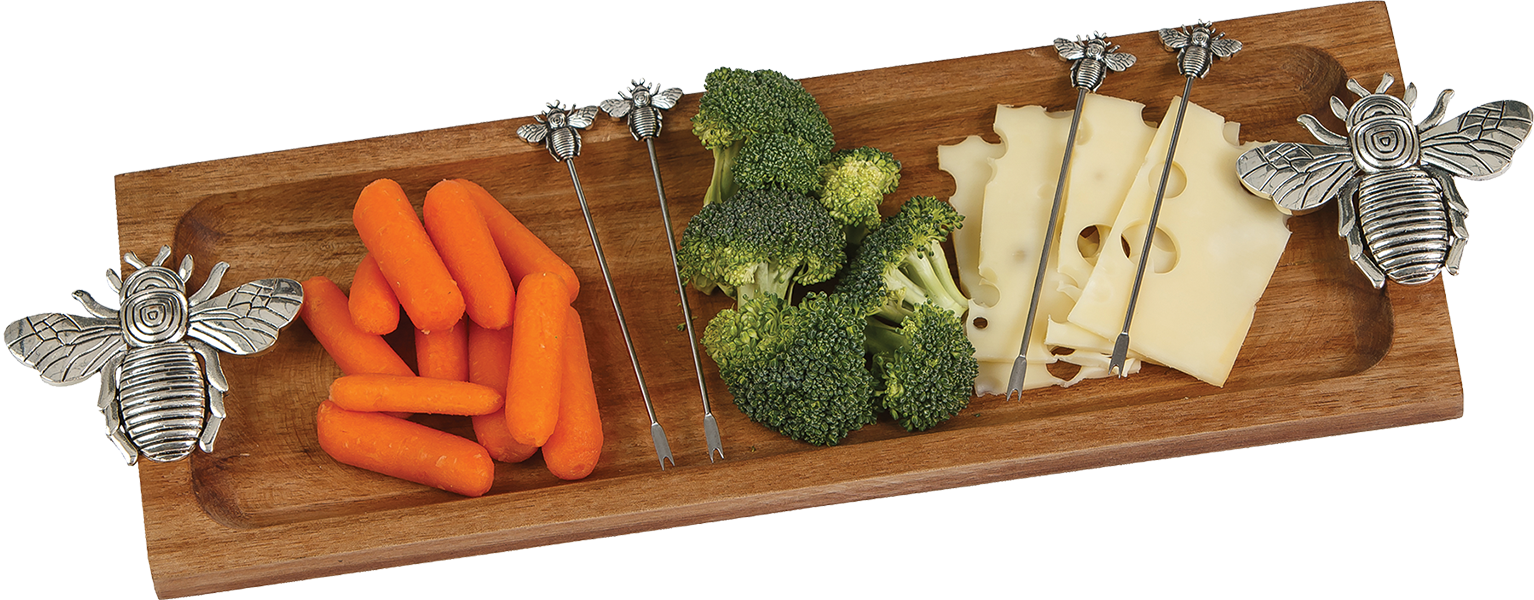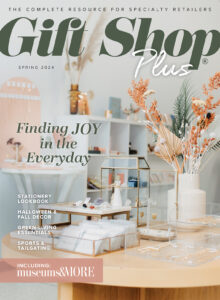Pink or Blue? Greening Baby Sales
Growing Green
Just a few years ago in 2001, retailer Gerry Lewarne had limited success selling glass baby bottles. A few years later, the chemical BPA (Bispenhol-A), made news headlines as a potential carcinogen. Plastic baby bottles made with BPA were suddenly suspect. Lewarne, owner of Crocodile Baby, a baby gear store in Vancouver, BC, says he tracked down his BornFree distributor and bought his entire stock of glass bottles. BornFree, a company based in Boca Raton, FL, wholesales in addition to other products, baby bottles free of Bisphenol-A. For its part, Crocodile Baby has had success selling glass baby bottles, ever since.
Holly Givens says that for many parents, having a child is one of the “triggers” that makes them go green. Givens is the public affairs advisor for the Organic Trade Association, headquartered in Greenfield, MA. Parents worry about BPA, about conventional cotton (often grown using potentially carcinogenic pesticides), and about baby lotions containing parabens, a widely used preservative. There is controversy about the carcinogenic side effects of parabens. Once news has broken linking a substance to a disease, it seems almost irrelevant whether there is sufficient evidence to prove the claim. Parents are still worried. According to Givens, they don’t want to take a chance when it comes to the safety of their children. Parents don’t want their children to be the guinea pigs, she says.
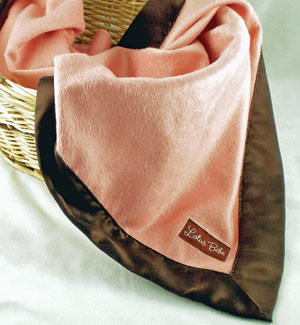 Chemicals that are allergy and asthma triggers for their children, are also of concern to parents, says Dr. Renee Hackenmiller-Paradis. She is the program director for environmental health for the Oregon Environmental Council in Portland, OR, an environmental, state-based non-profit to educate consumers about environmental issues and provide tools to reduce overall environmental impact. “I think new parents have a heightened awareness of what comes into their houses and their lives. They take a harder look at what they are doing,” says Hackenmiller-Paradis. Parents also “go green” because they see the direct benefits of contributing to a world that will be their children’s for the next 50 years, says Kathleen Raulin, owner of Lotus Bebe, wholesaler of luxury blankets in Moorpark, CA. It’s also one of the reasons why companies develop eco-friendly products. “We live in an area where it’s so awesome we want to protect it,” says Leesa Valentino, vice-president of Pedoodles, wholesaler of eco-friendly footwear, in Kalispell, MT.
Chemicals that are allergy and asthma triggers for their children, are also of concern to parents, says Dr. Renee Hackenmiller-Paradis. She is the program director for environmental health for the Oregon Environmental Council in Portland, OR, an environmental, state-based non-profit to educate consumers about environmental issues and provide tools to reduce overall environmental impact. “I think new parents have a heightened awareness of what comes into their houses and their lives. They take a harder look at what they are doing,” says Hackenmiller-Paradis. Parents also “go green” because they see the direct benefits of contributing to a world that will be their children’s for the next 50 years, says Kathleen Raulin, owner of Lotus Bebe, wholesaler of luxury blankets in Moorpark, CA. It’s also one of the reasons why companies develop eco-friendly products. “We live in an area where it’s so awesome we want to protect it,” says Leesa Valentino, vice-president of Pedoodles, wholesaler of eco-friendly footwear, in Kalispell, MT.
Doing the numbers
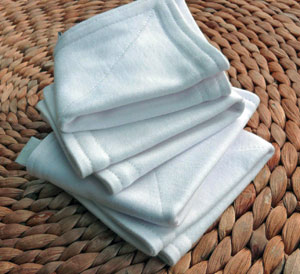 It comes as no surprise then that all this parental concern translates into a market that is poised for growth. Although recorded figures exclusively for the organic baby market are difficult to come by, the U.S. baby care supplies market as a whole, including organic products, was worth over $6.9 billion at retail in 2007, an increase of almost 5% over 2006. According to its 2008 report titled “Caring for Baby: The U.S. Market for Diapers, Bottles, Wipes and More,” Packaged Facts, a division of marketresearch.com, projects the market will grow to over $8.1 billion in 2012.
It comes as no surprise then that all this parental concern translates into a market that is poised for growth. Although recorded figures exclusively for the organic baby market are difficult to come by, the U.S. baby care supplies market as a whole, including organic products, was worth over $6.9 billion at retail in 2007, an increase of almost 5% over 2006. According to its 2008 report titled “Caring for Baby: The U.S. Market for Diapers, Bottles, Wipes and More,” Packaged Facts, a division of marketresearch.com, projects the market will grow to over $8.1 billion in 2012.
And for two categories of organic baby products that gift stores often carry—personal care and linens—there are phenomenal sales increases, according to the Organic Trade Association. Organic clothing and linen (for all age groups) has enjoyed an annual growth rate of nearly 40% since 2006, reports the OTA. Sales were projected to reach $397.5 million by the end of 2008. Organic personal care products across all age groups were also expected to continue their growth rate reaching $564.5 million by the end of 2008. Wholesalers and retailers in the organic baby market boast increases, as well. Noonoo, wholesaler of eco-friendly and organic baby blankets and toys with company headquarters in England and U.S. distributor headquarters in North Hampton, NH, predicts their sales at the end of 2008 would double their 2007 numbers.
Judith Velosky Martell, co-owner of Flying Squirrel, a store in Brooklyn, NY that sells baby gifts, toys, clothing and equipment, reports her customers are definitely interested in organic especially with clothing and baby gifts.”
Reading the labels
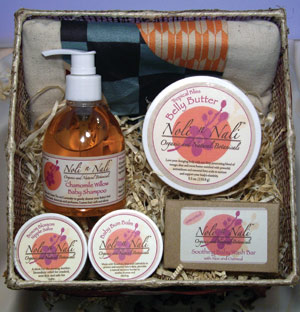 In a field that is poised for rapid growth, the word “organic” is waiting to be exploited and bandied about liberally. This is where labels come to the rescue. Kenda Haines, chief executive officer of Noli n Nali, wholesaler of organic and natural botanicals in Scotts Valley, CA, says the company has pursued three labels for its many products: the USDA organic seal; OASIS certification and certification from the Natural Products Association.
In a field that is poised for rapid growth, the word “organic” is waiting to be exploited and bandied about liberally. This is where labels come to the rescue. Kenda Haines, chief executive officer of Noli n Nali, wholesaler of organic and natural botanicals in Scotts Valley, CA, says the company has pursued three labels for its many products: the USDA organic seal; OASIS certification and certification from the Natural Products Association.
The USDA seal is an agricultural seal that can be used when 95% or more of the ingredients used in a product are certified organic ingredients. Noli n Nali’s Bosom Blossom Nipple Salve, Soothing Baby Wash Bar, Sleepy Baby Wash Bar and Baby Bum Balm, sport the USDA label.
Other products from Noli n Nali bear (or will soon do so) the OASIS seal and certification from the Natural Products Association. The OASIS seal, which stands for Organic and Sustainable Industry Standards, is the first organic standard for the U.S. beauty and personal care market. Products must contain at least 85% certified organic content.
Shades of green
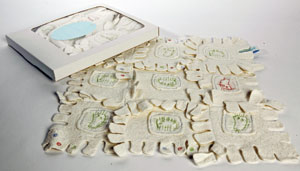 Often people are married to the term “organic,” but Megan Fenton points out that there are other green options out there. Fenton, who is the manager of The Little Seed, an eco-friendly baby boutique, in Los Angeles, suggests retailers look for clothing companies that use low impact dyes, or for wholesalers who reduce their carbon footprint in other ways. “It is all about finding an eco-balance,” she says. Being sustainable is important too. Lewarne, of Crocodile Baby, says on his store’s website, www.crocodilebaby.com, customers can click on a “Sustainable” link that takes them to a host of bamboo, natural rubber and wood baby products. Retailers can also offer eco-friendly products by stocking quality pieces. When customers buy a well-crafted product that they can hand down through the generations, versus a cheap toy that lasts for a bit and then gets thrown away and replaced by another one, they reduce their environmental impact. This is what Noonoo hopes to accomplish with their products. Marilyn Dexter, national sales and marketing director for the company, refers to their blankets and toys as investment pieces in a culture of cheap consumerism.
Often people are married to the term “organic,” but Megan Fenton points out that there are other green options out there. Fenton, who is the manager of The Little Seed, an eco-friendly baby boutique, in Los Angeles, suggests retailers look for clothing companies that use low impact dyes, or for wholesalers who reduce their carbon footprint in other ways. “It is all about finding an eco-balance,” she says. Being sustainable is important too. Lewarne, of Crocodile Baby, says on his store’s website, www.crocodilebaby.com, customers can click on a “Sustainable” link that takes them to a host of bamboo, natural rubber and wood baby products. Retailers can also offer eco-friendly products by stocking quality pieces. When customers buy a well-crafted product that they can hand down through the generations, versus a cheap toy that lasts for a bit and then gets thrown away and replaced by another one, they reduce their environmental impact. This is what Noonoo hopes to accomplish with their products. Marilyn Dexter, national sales and marketing director for the company, refers to their blankets and toys as investment pieces in a culture of cheap consumerism.
From smelling good to feeling good: baby is covered
Whether organic, eco-friendly or both, the categories of products in the marketplace catering to babies are numerous. To begin with, there are a host of products to keep baby clean and smelling sweet, such as those offered by Lu Lu’s American Baby Organics, based in St. Peters, MO. The company’s personal care products come in flashy silver containers with black and red lettering. 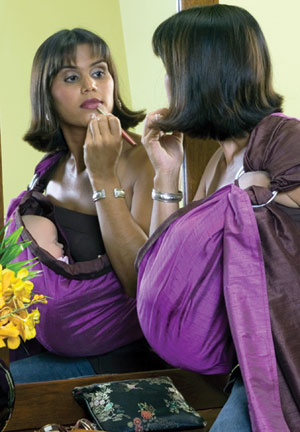 “People used to think of organics as stereotypical cream or brown-colored, and plain and simple. I think our new line has been so popular because we combined healthy organics with a cool theme,” says Carolyn Richards, the company owner. Lu Lu’s products are popular choices among parents with children who are allergic to dyes and chemicals found in many baby shampoos, says Richards. She reports that all of Lu Lu’s products come from 100% natural ingredients, using organic ones whenever possible. In addition to personal care products for baby, retailers will find eco-friendly shoes such as the ones from Pedoodles. In 2008, the company decided to make their products from 100% recycled leather. Pedoodles are also packaged in boxes made with recycled components. And then there are a host of wholesalers offering products that keep baby warm and cozy. Lotus Bebe sells eco-friendly blankets made from bamboo and soy (using the leftovers from the production of tofu). Raulin says the blankets have the softness of cashmere. Noonoo’s blankets are made from bamboo and silk, and their comforters are made with felted lambswool, often with three-dimensional interactive felt add-ons to stimulate exploration.
“People used to think of organics as stereotypical cream or brown-colored, and plain and simple. I think our new line has been so popular because we combined healthy organics with a cool theme,” says Carolyn Richards, the company owner. Lu Lu’s products are popular choices among parents with children who are allergic to dyes and chemicals found in many baby shampoos, says Richards. She reports that all of Lu Lu’s products come from 100% natural ingredients, using organic ones whenever possible. In addition to personal care products for baby, retailers will find eco-friendly shoes such as the ones from Pedoodles. In 2008, the company decided to make their products from 100% recycled leather. Pedoodles are also packaged in boxes made with recycled components. And then there are a host of wholesalers offering products that keep baby warm and cozy. Lotus Bebe sells eco-friendly blankets made from bamboo and soy (using the leftovers from the production of tofu). Raulin says the blankets have the softness of cashmere. Noonoo’s blankets are made from bamboo and silk, and their comforters are made with felted lambswool, often with three-dimensional interactive felt add-ons to stimulate exploration.
Amenity’s sheets, blankets and bumper covers are made with certified organic cotton, says Kristina de Corpo, co-owner of the Los Angeles-based company. Amenity feels strongly about the theme of nature in their nursery line and prints (from organic dye) depict images such as a meadow with rabbits, a wetlands scene with ducks and deer standing in the woods. Customers can even carry baby in an organic sling. Serena & Lily in Sausalito, CA, offers slings with hand-embroidery on 100% organic cotton (not certified) with a soft, brushed interior. The sling is one seamless piece of fabric without buckles, belts or straps, created for ease of wear. Baby slings from wholesaler Sakura Bloom are made with natural fibers including organic Irish linens, Indian dupioni silks, and Southeast Asian wild silks.
The price de resistance?
It is no secret organic products are costly to make. For example, take the grapefruit seed extract that Lu Lu’s American Baby Organics uses as a preservative. It costs $14 per ounce. And this, in turn, gets passed on to retailers and customers. Monica Karst, owner of Baby Shoppe Santa Cruz in Santa Cruz, CA, a store that sells clothing, gifts and gear for baby, agrees customers want organic but don’t want to pay the price, especially as their babies continue to grow. As a result, she promotes baby organic gifts heavily. “Once you get past the 6-9 months range, however, people aren’t willing to spend it,” Karst says.
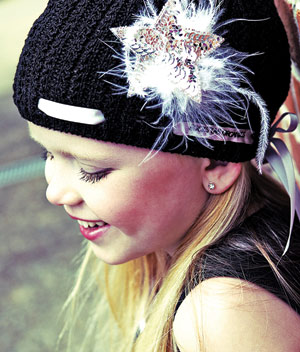 To overcome this resistance, some wholesalers such as Noonoo, offer a variety of price points so that retailers can stock what they are comfortable with, says Dexter. She points out that Noonoo’s blankets retail over a wide range: from $15 for pocket-sized portable versions of comfort blankets, to $90 for silk welcome blankets. There are others in the marketplace however, who are finding little price resistance. “Our prices are high end, but people are still looking for things like that,” says Raulin of Lotus Bebe, who retails her soy blanket for $98, and her bamboo one for $59. Richards at Lu Lu’s agrees it is hard right now, but she cites the example of her own family: “Our family is still buying organic milk, using organic deodorant without aluminum, shampoo withoutparabens, dyes, and harmful chemicals, because I know what the chemicals can do, so no matter what the cost, I choose like so many other moms, not to put those harmful chemicals on myself or on my children’s bodies.”
To overcome this resistance, some wholesalers such as Noonoo, offer a variety of price points so that retailers can stock what they are comfortable with, says Dexter. She points out that Noonoo’s blankets retail over a wide range: from $15 for pocket-sized portable versions of comfort blankets, to $90 for silk welcome blankets. There are others in the marketplace however, who are finding little price resistance. “Our prices are high end, but people are still looking for things like that,” says Raulin of Lotus Bebe, who retails her soy blanket for $98, and her bamboo one for $59. Richards at Lu Lu’s agrees it is hard right now, but she cites the example of her own family: “Our family is still buying organic milk, using organic deodorant without aluminum, shampoo withoutparabens, dyes, and harmful chemicals, because I know what the chemicals can do, so no matter what the cost, I choose like so many other moms, not to put those harmful chemicals on myself or on my children’s bodies.”
For retailers catering to parents who want to keep their babies pure and chemical-free, who care about the environment and the world their children will inherit, whether it’s a $15 item or a $98 one, there are “a whole range of items out there to get a family off to a good start,” says Givens. Thus, organic and eco-friendly baby products make one profitable proposition. As retailer Lewarne points out, parents are having children later in life and have more money to spend on them. “And why wouldn’t they spend money on the most precious things in their lives?” Parental concerns about the adverse effects of chemicals might just keep the green baby category going despite a slow economy. As Kristina de Corpo from Amenity puts it: “I think people will still spend money on this choice despite the economy and choose to spend less in other areas of their lives.”
Mouse over images below to view.
